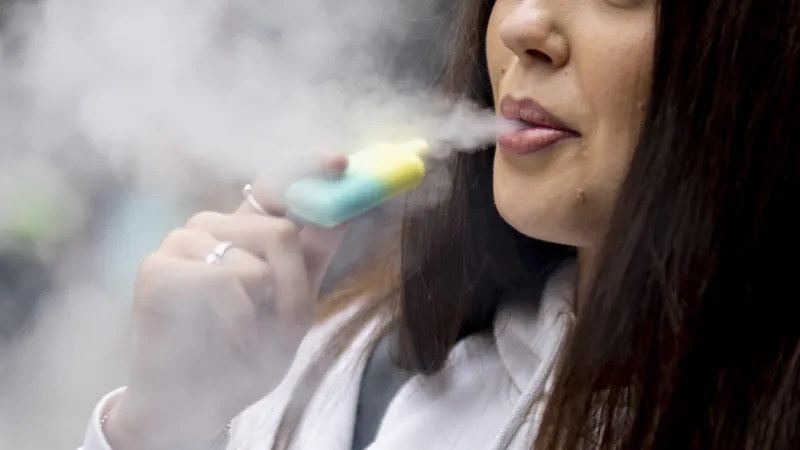
The government is considering announcing a new tax on vapes at the Budget next week.
Currently, vaping products are subject to VAT – but unlike tobacco, they are not also subject to a dedicated levy.
Tobacco duty could also increase at the Budget, to ensure that vaping remains cheaper.
Ministers fear that the relatively cheap cost of vaping means that the products are more accessible for young people and non-smokers.
The government first said it was considering a vaping levy at November’s King’s Speech, citing a “significant differential” with tax on tobacco.
According to the Times, which first reported the story, the new duty will be levied on the liquid in vapes, with higher tax rates for products with more nicotine.
Treasury analysis suggests the new vaping tax, along with the rise in tobacco duty, could eventually raise around £500m a year.
The separate tax on tobacco products was raised by 2% more than inflation last year as part of the Autumn Statement. Official economic forecasts predict tobacco duty will raise £10.4bn this year, driven by the higher rate.
Vaping products and non-tobacco nicotine are taxed at 20% VAT, with a lower 5% rate for e-cigarettes regulated as medicines.
Under the government’s “swap to stop” scheme in England, traditional smokers can get free vaping “starter packs” to help them quit tobacco.
The NHS recommends nicotine vaping as a way for adult smokers to quit tobacco. It says vaping is “substantially less harmful”, although it is “not completely harmless”.
Several European countries have e-cigarette taxes, with the European Commission planning to introduce a minimum level across the EU.
‘Black market’ fears
The UK Vaping Industry Association, an industry body for vape manufacturers, said a new tax would “penalise” smokers who have made the switch from tobacco.
John Dunne, its director general, added it would also make vapes a “less accessible” alternative for people in poorer areas with the highest smoking rates.
He argued that it could also “fuel a black market which is already in danger of being out of control”.
It comes after plans were announced last month to deliver a UK-wide ban on disposable vapes, alongside restrictions on flavours and how they can be packaged.
UK government ministers, who are responsible for delivering the ban in England, say they hope to pass the relevant legislation before the next election.
The ban would then come into force in early 2025, with retailers given six months to make the changes once the timing is confirmed.
Budget warning
The government also plans to increase fines for retailers that sell vapes to under-18s, which is illegal.
Next week’s Budget will see the government unveil its tax and spending plans for the year ahead amid the backdrop of sluggish economic growth.
Chancellor Jeremy Hunt has hinted he would like to lower taxes, in what could be the last Budget before a general election.
But the Institute of Fiscal Studies, a think-tank, has said the UK is in a “poor position” to do so.
It noted that at the Autumn Statement, the chancellor was “only just” on course to meet the government’s rule that official forecasts should show debt falling as a share of national income in five years’ time.
 Weekly Bangla Mirror | Bangla Mirror, Bangladeshi news in UK, bangla mirror news
Weekly Bangla Mirror | Bangla Mirror, Bangladeshi news in UK, bangla mirror news







